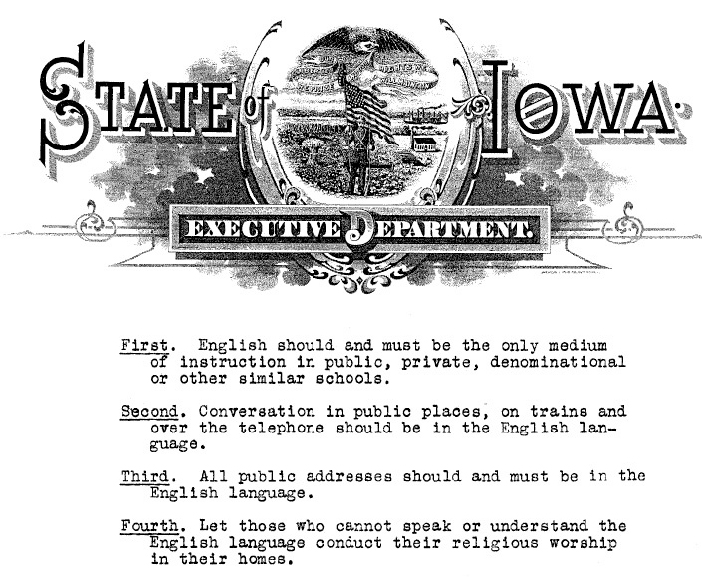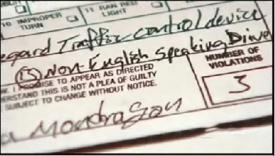On May 23, 2018, America celebrated the centenary of the Babel Proclamation. That was the day, 100 years ago, when Iowa Gov. William Harding banned the public use of all foreign languages: in schools, on trains, at meetings, in church, even on the phone.
They called it the Babel Proclamation. America was at war, and German—commonly spoken in Iowa at the time—was the language of the enemy. When asked why he banned all languages and not just German, Harding explained that “German intrigue does not confine itself to the German language. The fact is they find it more convenient now to use other languages.” Apparently no one thought to ask Harding, “So if German spies speak English, shouldn’t you ban English too?”
As for prayer, Harding told the Chamber of Commerce, “I am telling those who insist upon praying in some other language that they are wasting their time, for the good Lord up above is now listening for the voice in English.”
Oh, and that First Amendment business in the Constitution? Welp, according to the governor, freedom of speech is guaranteed only if you speak English.

When the U.S. entered World War I, it mounted a war on German as well as Germany. Almost all American schools stopped teaching German. In Iowa, German books were burned. German-language churches were trashed or torched—and a couple of Danish churches too, because Danish sounded so German. Several women were fined for speaking German on rural party-line telephones. And German speakers were physically attacked by mobs.
Gov. Harding assured Iowa’s German speakers that his language ban was for their own good: it would protect them from the violence that their speech provoked. But the Babel Proclamation had the opposite effect. It became a license to hate. Law or no law, from Nebraska to Texas, people speaking foreign languages were beaten, tarred and feathered, made to kiss the flag, hauled before an inquisition, or hanged in effigy. One pastor was even strung up by an angry mob for speaking German, but police managed to intervene and cut him down before he died.
German words were even banned from English, at least for the duration. Remember when the Congressional cafeteria served “freedom fries” because the French didn’t support America in the First Gulf War? During World War I, patriotic Americans stopped eating sauerkraut, forcing desperate sauerkraut producers to rename their product “liberty cabbage.” A bill in Congress would have stopped the Post Office from delivering mail to any city or street named “Berlin.” And West Point reported an outbreak among the cadets of “Liberty Measles.”
After the War, the Babel Proclamation expired, but America’s war on language continued. Foreign language study never returned to anything like pre-war levels. And an immigration “reform” in 1924 effectively removed foreign languages, and their speakers, from America’s streets.
A second reform in 1965 opened immigration up to nonanglophones once again, but once again, English speakers struck back to defend their embattled native tongue. In 2017, Srinivas Kuchibhotla, an engineer who had been speaking Telugu with a colleague, was shot dead in a bar in Olathe, Kansas, by an America-firster shouting “Go back to your own country.” A few years before that, Dallas police were writing tickets for “non-English speaking driver” for drivers who were speaking Spanish even though there’s no law in Texas that says drivers have to speak English.

This renewed war on language is why, almost one hundred years after the Babel Proclamation, a lawyer in New York berated workers at a deli who were speaking Spanish to one another, threatening to call ICE on workers he decided were undocumented just because they weren’t speaking English.
And it’s why a Border Patrol agent stopped and questioned two women for speaking Spanish to each other while buying milk at a gas station in Havre, Montana. When the women asked why they were being detained, the agent replied, “It has to do with you guys speaking Spanish in the store, in a state where it’s predominantly English-speaking.” Plus they were near the border—the Canadian border.
That ICE agent didn’t say, “Montana is the new Iowa.” He didn’t say, “Speak English or I’ll throw you in a detention camp.” Or, “I don’t care if you are American citizens, because speaking Spanish means I can revoke your citizenship if I want to or at least make your lives miserable.” He didn’t have to.
It doesn’t dawn on these defenders of the language that English is also an immigrant tongue in the New World, one that swam ashore, illegal and uninvited, in the 17th century and immediately pushed out all the competition.
America won its war on language long before the Babel Proclamation, and yet American nativists seem bent on reviving the foreign language ban. The English Language Unity Act (HR 997) would make English the official language of American government, raising the groundless fear that government workers might suddenly start speaking some other tongue. And a new immigration proposal would require anyone seeking a visa to be a fluent English speaker before they apply.
These bills won’t reinforce English—newcomers to the United States learn English as quickly as they can. What the laws do instead is send a message to nonanglophones: “We don’t want you. Go back where you came from”—even if where they came from is Des Moines, or Havre, or Olathe.

